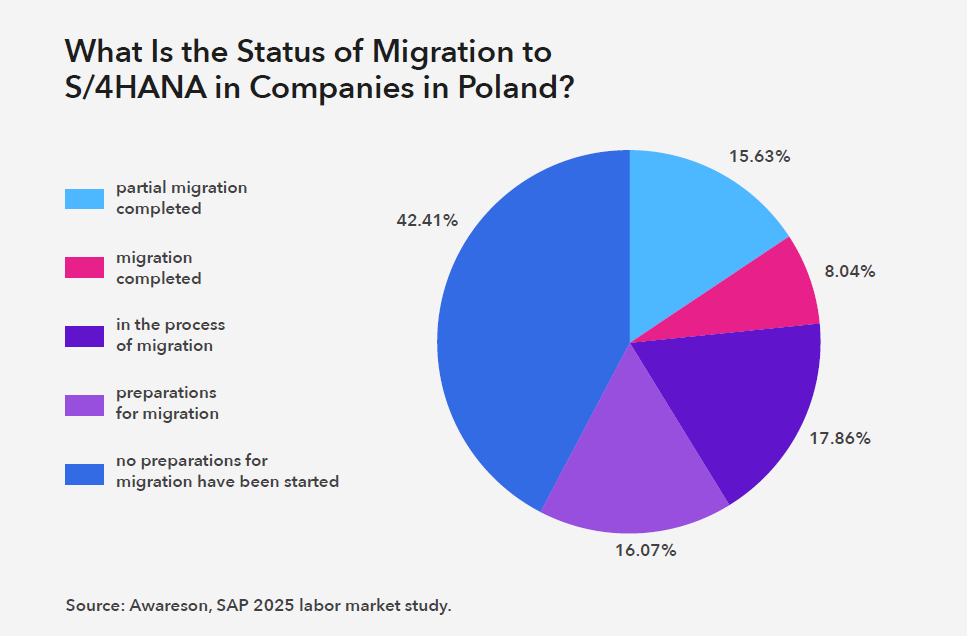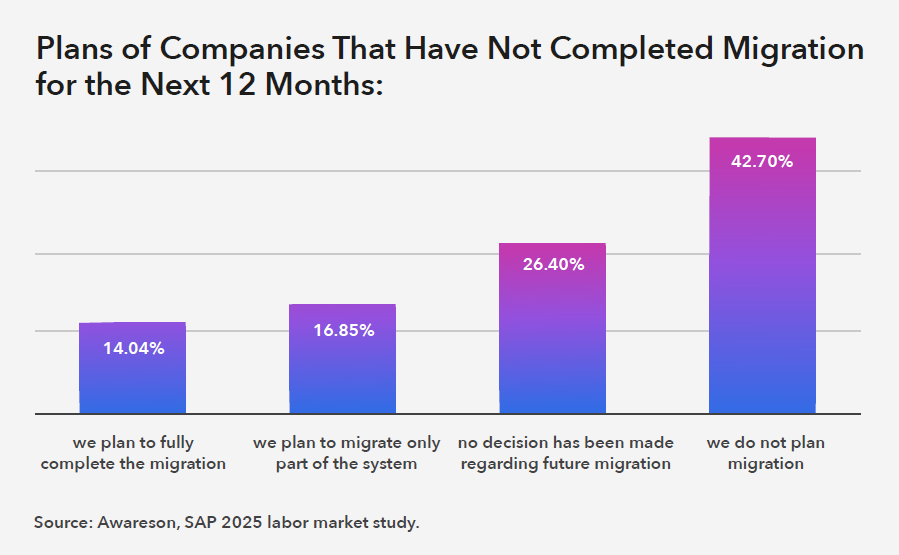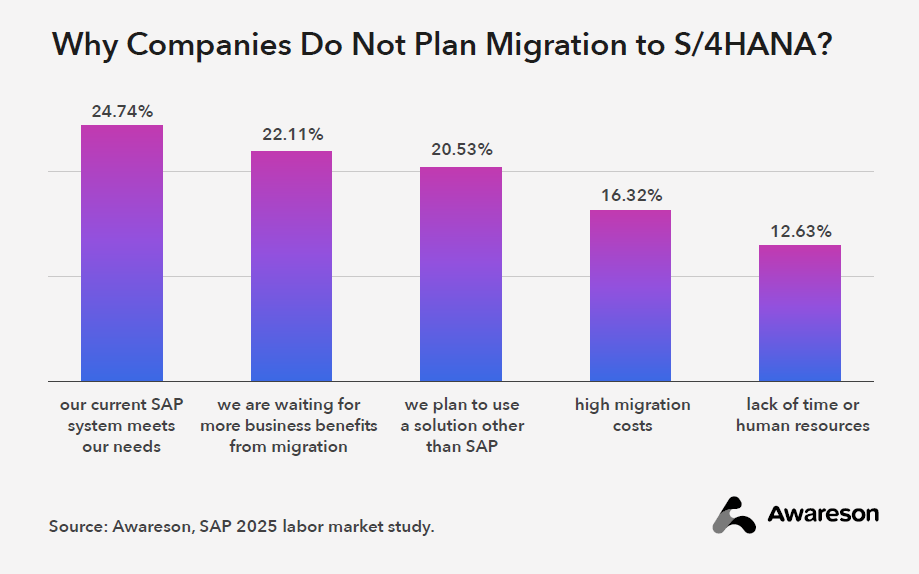The State of S/4HANA Migration in Poland

SAP S/4HANA is not merely an upgraded version of the ERP system; it represents a new benchmark within SAP’s portfolio.
Built on the HANA database and featuring a simplified architecture with the Fiori interface, its implementation demands not only a technological shift but also a fundamental re-evaluation of business process design. SAP’s decision to end support for ECC requires organisations currently relying on the traditional ERP to determine the timing and approach of their transformation. The urgency is heightened not only by official deadlines but also by limited market resources.
Support for ECC is set to expire at the end of 2027. However, SAP announced in early 2025 that extensions are possible — up to 2030 through paid support for certain versions, and until 2033 for major clients adopting the cloud-based SAP ERP private edition under the RISE with SAP model.
Actual Progress of Implementations
Since SAP first announced the end of ECC support in 2020, nearly half of organisations have yet to initiate any significant action.
Only one in six companies has completed their migration, with some merely undertaking preparatory or pilot phases. This indicates that the majority still face the core challenge of transformation.
Alarmingly, among organisations that have not yet migrated, nearly 43% state they do not intend to move to the new version, and 25% remain undecided.

Expert commentary
The IT Labour Market in Poland within the SAP Area is entering a dynamic phase, driven by the approaching end of support for the SAP ECC version. Although 2027 may seem distant, the lifecycle of a project as large as a transformation to S/4HANA requires careful and early planning.
Our dialogue with Polish enterprises shows that many are facing a serious decision-making challenge. The main concerns slowing down action are the complexity of the project, the risk of disruptions to ongoing operations, and the lack of a clear business justification for change.
Transformation to S/4HANA is more than a technical migration. It is a strategic investment in the future, enabling companies to redefine their business model and build lasting competitive advantage. The benefits are multi-dimensional: from real-time optimisation of operational processes, through access to advanced analytics, to integration with technologies such as AI and IoT.
The key to success is proper preparation, and SAP, as the software producer, is the ideal partner on this journey. We support clients in defining concrete benefits and planning actions so that they deliver real business value. Our support also covers change management within the organisation – a crucial element that determines the success of the project and the adaptation of employees to new processes.
We guarantee comprehensive quality management of the implementation, based on a proven methodology and dedicated SAP Integrated Toolchain tools, such as SAP Signavio for process optimisation and LeanIX for enterprise architecture management.
Deciding on an S/4HANA transformation is a process that requires strategic planning. It is not worth delaying when you have at your disposal a reliable partner and tools that guarantee success.
Radosław Mierzejewski
Delivery Manager at SAP
Reasons for Delay – Understandable, Yet Risky
Companies that are not planning migration most often explain their decision by pointing to the stability of their current system and arguing that the benefits proposed by SAP are, in their view, not convincing enough from a business perspective. Many managers surveyed by Awareson admit they do not see real added value in implementing S/4HANA – concerns about high costs, lack of resources, and operational overload dominate. At the same time, some organizations perceive SAP’s change in its support model as pressure to transform, not always aligned with their internal priorities, which further postpones migration decisions.

The new version of the system, however, is much more than a refreshed interface – it brings entirely new ERP capabilities: simplified processes, better access to data, readiness for further digitalization, and above all, access to industry-standard solutions. It also ensures stronger security through SAP’s active support, along with the awareness that in just a few years it will become increasingly difficult to find specialists willing to work with ECC.
Surprisingly many companies are considering switching to a different ERP provider or even developing their own solutions. For many, the challenges remain the cost of transformation to S/4HANA, lack of time, and an insufficient number of available specialists. Among these reasons, one stands out as particularly critical from an IT perspective – the lack of competencies. SAP teams are today often focused on maintaining the old system. Only a small share of specialists have experience with the new version – making every implementation a major organizational effort, with additional costs and a real risk of project delays.
A Market in Limbo
We are observing a stalemate. On the one hand, the market knows change is inevitable – on the other, it is not yet ready for it. Time to prepare for migration is running short, while competition for experienced specialists is intensifying. Nevertheless, as the data shows, many companies still operate under the principle of “we’ll see later.” It is a risky strategy.
Expert commentary
More than 40% of companies are still facing the migration to S/4HANA. This is a clear warning signal for organisations planning their transformation. The approaching deadline will trigger a sharp increase in competition for experienced consultants – particularly those with at least two full implementation cycles behind them. Experts with niche and scarce skills are also gaining importance, especially in areas such as PP, TM, EWM and integration. This is knowledge that cannot be developed ad hoc.
Market data shows that around the turn of 2025/2026, several large transformation projects will be launched in Poland, each requiring between 20 and 50 consultants. Such multi-year contracts may significantly reduce the availability of specialists on the local market. An additional challenge is the growing competition from global rollouts, which are increasingly engaging experts from Poland by offering attractive rates and conditions.
It is therefore crucial to plan resource needs as early as possible – both in terms of competencies and timing of engagement. This will help secure critical skills, plan budgets more effectively, and minimise the risk of delays in project delivery.
Agata Paliwoda
Head of Outsourcing, Awareson
Want to know more? Download the full SAP S/$HANA team building report.
DOWNLOAD REPORT



